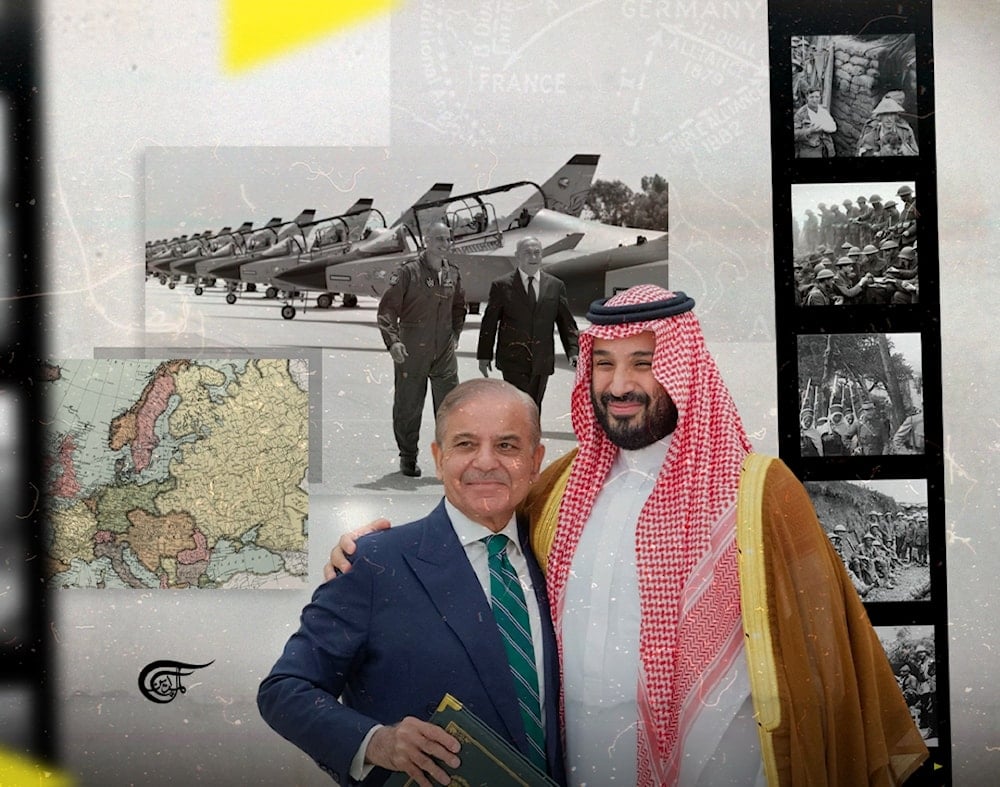The evolving Middle Eastern Chess Board: Defense pacts and looming danger of another great war
Shafei Moiz Hali argues that the Saudi-Pakistani defense pact marks a shift toward realist security in response to Israeli aggression, but warns it may spark WWIII by mirroring pre-1914 alliance dynamics.
-

The most sobering thought is that everyone involved can see the historical parallels, but no one is stopping the menace known as “Israel,” which is dragging the world towards disaster. (Al Mayadeen English; Illustrated by Batoul Chamas)
Israeli misadventures have spilt over to the city centers of the once supporters of de-escalation. The continuous violation of international law, from attacking Iranian facilities under the guise of “pre-emptive” strikes to attacks on Qatari diplomatic quarters, often backed by Uncle Sam, has left “Israel” increasingly isolated while pursuing the eradication of Gaza. With shifts in global order and changing interests, Saudi Arabia (KSA) has now joined Pakistan in a defensive pact after losing faith in Western-style diplomacy.
The irony lies in the persistent disregard for international laws and rulings, compounded by constant vetoes on ceasefire resolutions. In response, the Gulf is now scrambling to create alliances reminiscent of the power blocks of World War I. A practical agreement between KSA and Pakistan: Pakistan possesses significantly strong military capabilities, excels in its nuclear program, and its recent performance against Western military equipment used both in 2019 and in 2025 vis-à-vis India. What Pakistan lacks is economic stability; the solution being oil money. Though limited details have been revealed regarding the joint agreement, it is known that the main aim is the creation of an umbrella to deter Israeli attacks on both countries. The timing of this pact clearly indicates that GCC countries are losing their confidence in the US shielding them from unprovoked Israeli attacks. It also reflects rising concerns at “Israel’s” reckless belligerence, which tramples international law, national sovereignty, and global institutions alike.
This is why this pact is a step towards realism, because “Israel’s” recent unchecked behaviors have reduced the UN into nothing more than a glorified debating club, leaving the Middle East to fend for itself.
An important factor that needs to be considered here is that 80-85% of Pakistan’s military arsenal is overwhelmingly of Chinese origin. During the recent military clash between Pakistan and India, Pakistan was able to neutralize Indian S-400 air-defense systems and shoot down six Indian jets, chiefly owing to Chinese equipment and satellite data links. Which begs the question: what role will China play in this defense pact?
It is an open secret that Riyadh has been inching closer to Beijing when it comes to military cooperation, especially in the scope of UAVs and air defense systems. Pakistan is a very close and strategic ally of China. If we examine this pact in light of Chinese backing, it doesn’t simply remain a mere diplomatic stunt to deter “Israel,” as some analysts around the globe are suggesting. This pact becomes quite potent; on one hand, we have the availability of the Saudi piggybank to fund modern arms procurements. On the other, we have the battle-hardened, combat-driven, well-trained and professional Pakistani military equipped with nuclear weapons; So much so that Lt. Gen. P. R. Shankar, a retired three-star general of the Indian army, said that he’d “prefer fighting the Chinese,” and that the Pakistani military is particularly adept at operating Chinese equipment, remarking that “they are good at fighting.”
Another factor that requires attention is the growing search for allies in tough times. There are rumors that Türkiye may formally reach an agreement with Qatar akin to the Saudi-Pak Defense pact. Egypt is also under pressure and is weighing its options. On one hand, it remains dependent on the US aid; on the other, Washington’s guarantees of protection have collapsed after “Israel’s” attack on Qatar.
The UAE and Bahrain, despite being signatories of the normalization accords with "Israel", don’t feel safe. Russia has been present in Syria since 1971, and has a naval base as well as an air force base. We already know that China will have a role to play in the Saudi-Pak defense pact. In the case of “Israel,” the US provides diplomatic cover and support for “Israel’s’ every dirty move.
This budding web of alliances in the Middle East, with all the major powers in the world at play, recalls a déjà vu of shifting alignments that set the stage for World War I (WWI).
Just as in the early 1900s, alliances were the first distinctive aspect that showcased the brewing of a global disaster. Skirmishes and battles/wars in various regions, such as the Bosnian and Moroccan crises (1908 and 1905, respectively), along with the Balkan wars, are similar to today’s genocide in Gaza, attacks on Iran and Qatar, the Armenian skirmish, the Pakistan–India debacle, and Thailand and Vietnam.
This is a showcase of breaking away from the current order of things, moving towards anarchy, i.e. world war. “Israel’s” ever more vicious behavior, attacking without provocation, without international consequences, resembles the diplomatic arrogance displayed by pre-war Austro-Hungary. Much as Austro-Hungary’s ultimatum to Serbia set off a chain reaction of alliance obligations, Israeli aggression against regional actors will be primed to trigger overlapping defense commitments that would spiral beyond regional control.
All this could be avoided. For decades, “Israel” has been treated like a spoiled child whose tantrums have been indulged rather than being checked by caning, defended by American vetoes, and protected against law. Even though owing to “Israel’s” recent activities, some European countries have begun to ostracize “Israel’s” illegal activities by placing sanctions. China and Russia are also vying to mediate peace deals. Youth in the US are also staging protests to curb US funding and military backing for “Israel.”
All these are steps in the right direction, but some argue that this mounting pressure on “Israel” is provoking Benjamin Netanyahu and pushing him to take drastic measures to rock the region into chaos, as a means of exercising ‘control’. Within “Israel,” the government suppresses opposition parties, while externally it seeks to keep neighboring countries fragmented. This allows “Israel” to use these fractured territories as corridors for its attacks and buffer zones.
To conclude, the Saudi-Pak defense pact, though a realist approach to counter Israeli aggression and the failure of Western liberal policies, is definitely a potent solution if one is to look at it in isolation. Within the wider picture, it can be viewed as becoming a cog which may drive the wheels in the direction of WWIII, particularly with sustained Israeli aggression and the formation of alliances between Gulf countries and other external partners. All this eerily resembles the pre-WWI state of Europe.
The most sobering thought is that everyone involved can see the historical parallels, but no one is stopping the menace known as “Israel,” which is dragging the world towards disaster.

 Shafei Moiz Hali
Shafei Moiz Hali
 6 Min Read
6 Min Read











